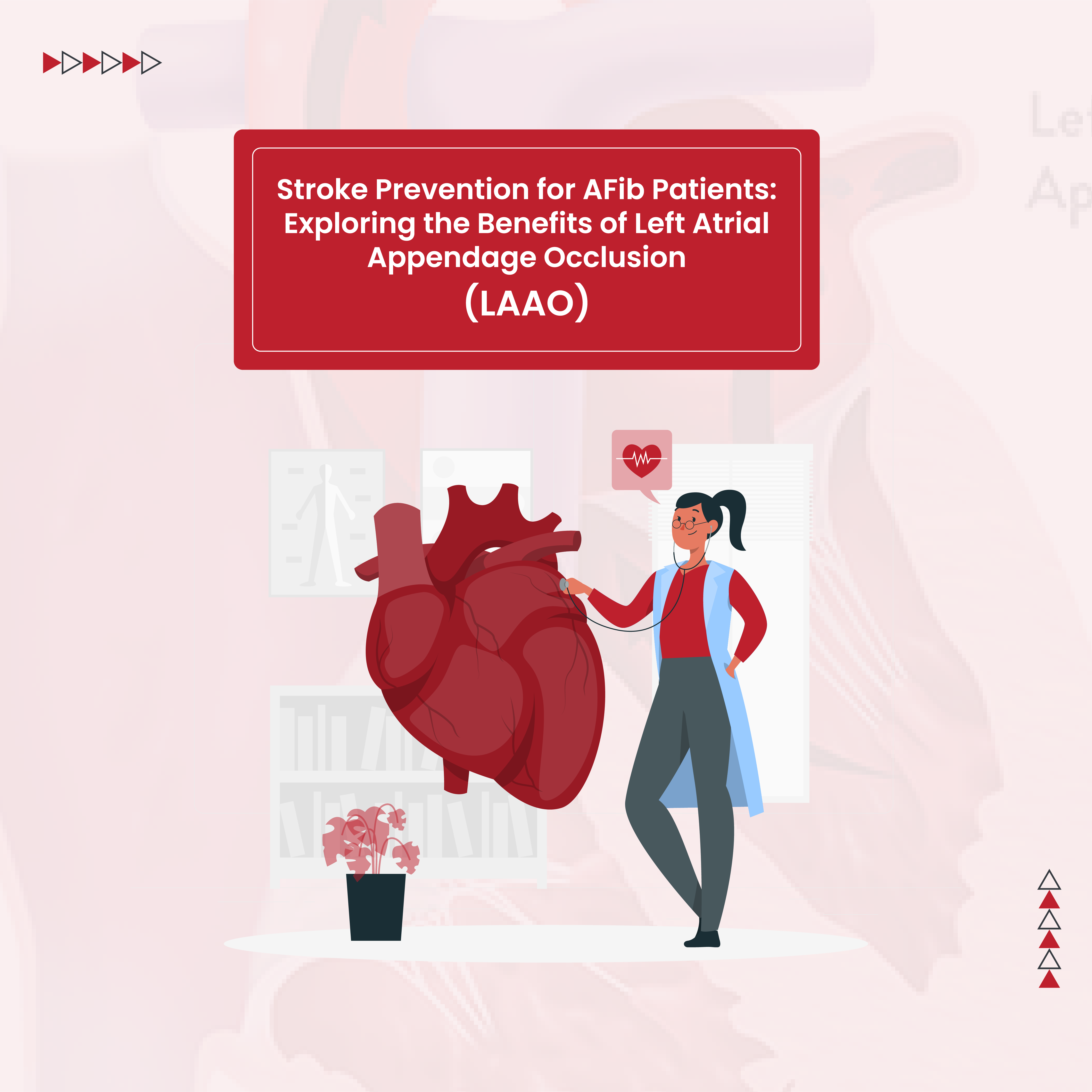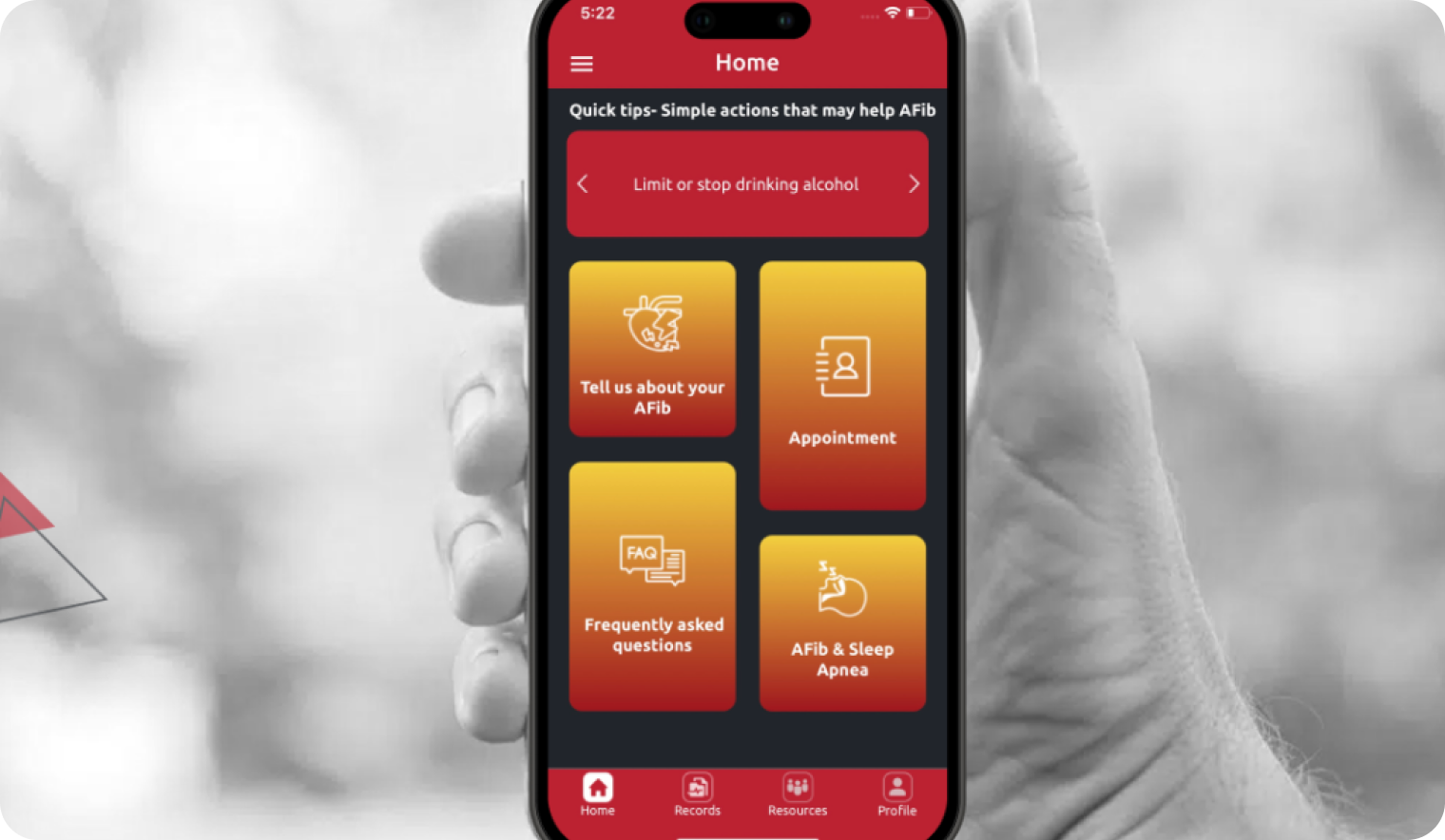Negative emotions such as anger, stress, anxiety and sadness can trigger atrial fibrillation (AFib). Atrial fibrillation affects over 3 million people in the United States and is the most common abnormal heart rhythm (arrhythmia). AFib can cause symptoms of palpitations, fatigue, shortness of breath, chest pain, and decreased exercise capacity and can have a significant impact on quality of life. Anxiety and/or depression is present in over 40% of people with atrial fibrillation, which is higher than the incidence in the general population.
A relationship between stress and atrial fibrillation was first described in 1964 amongst healthy Air Force servicemen who were noted to have newly diagnosed atrial fibrillation after an anger or stress episode. In 1968, a case series published in the journal Annals of Internal Medicine reported that, amongst study participants, 27% of AFib episodes were attributed to emotional stress. Similar findings have been observed in additional studies over the subsequent decades. In addition to a link between acute stress and atrial fibrillation, studies have found an association between negative personality traits, like hostility, and environmental stressors, like work stress, and AFib.
The relationship between stress and atrial fibrillation is not fully understood. The association is likely multifactorial with stress and negative emotional states acting directly and indirectly to increase atrial fibrillation. The direct effects of stress on atrial fibrillation are linked to the increased sympathetic nervous system (fight or flight) activation that is seen in high stress situations. Indirectly, stress can negatively affect our physiology, health behaviors (i.e. smoking, diet, exercise habits) and life choices which increase the development of AFib risk factors like heart disease, high blood pressure, heart failure, obesity, excess alcohol intake, smoking and diabetes. Regardless of the exact relationship between stress and atrial fibrillation, helping people reduce stress and adequately address mental health is an important component of AFib management.
Can stress trigger an AFib episode?
It is well-documented that the incidence of atrial fibrillation increases in the setting of physical stressors like a serious medical illness or surgery. For example, post-operative atrial fibrillation occurs in 20-50% of patients who have undergone heart surgery. Transient AFib is also seen in greater than 40% of patients in the intensive care unit. The stress of illness or surgery increases inflammation, activates the sympathetic nervous system and increases the release of stress hormones, all of which can put extra pressure on the heart, irritate the heart’s electrical system and trigger atrial fibrillation.
In terms of stress, the body is not able to differentiate between physical stress and emotional stress. Therefore, the same sympathetic nervous system activation that occurs in response to a physical stress is also seen with psychological stressors, such as anger, anxiety, and depression. In the acute setting, a stressor such as an angry outburst is associated with a transient increase in heart rate, blood pressure, inflammation and stress hormones which can all act as potential triggers for atrial fibrillation. People with a history of atrial fibrillation have been observed to have a two-fold increased risk of an AFib episode after an acute anger or stress event.
Long-term stressors, like work stress, are also associated with an increased risk of atrial fibrillation. Recent studies have shown that work stress and longer working hours were associated with a higher incidence of atrial fibrillation. This may be secondary to the direct effects of work stress on sympathetic nervous system activation and inflammation. However, it is also likely that certain behaviors, like decreased exercise and unhealthy diet, accompany long working hours. A more sedentary lifestyle and poor diet can contribute to obesity, diabetes and high blood pressure which all increase the risk of atrial fibrillation. Also, unhealthy levels of stress can lead to harmful coping mechanisms like smoking and excess alcohol intake. Again, both of these behaviors increase the risk of atrial fibrillation.
To improve our understanding of how the nervous system contributes to atrial fibrillation, it can be helpful to know more about the physiology of atrial fibrillation. Atrial fibrillation is caused by chaotic electrical signals which originate in the left upper heart chamber (atrium). Stress increases sympathetic nervous system activation which affects electrical activity in the left atrium. It also causes changes in left atrial pressure and size. In the short-term, changes in the left atrium can trigger atrial fibrillation. Over the long-term, more extensive structural changes develop in the left atrium which help maintain atrial fibrillation and make it harder for the heart to stay in a normal rhythm.
In the process of studying the association between stress and atrial fibrillation, researchers observed that medications that mimic the effects of sympathetic nervous system activation are sometimes used during atrial fibrillation procedures to try to trigger atrial fibrillation. Therefore, they investigated if medications which decrease the body’s response to stress and subsequent sympathetic nervous system activation can help prevent atrial fibrillation. Beta-blockers are a class of medications which are frequently used for atrial fibrillation to help control the heart rate. Beta-blockers also decrease the body’s response to stress. Researchers studied people with atrial fibrillation who had previously had a demonstrated link between stress/anger and AFib episodes. They found that participants who received beta-blockers had a decreased incidence of anger/stress triggered atrial fibrillation compared to those participants who did not receive beta-blockers.

How do you calm atrial fibrillation?
Stress, anxiety, sadness and anger can trigger atrial fibrillation. One study attempted to quantify the effect of these negative emotions on atrial fibrillation. Study participants had a history of atrial fibrillation but were in a normal rhythm at the start of the study. At the end of every day they recorded their emotional state and the presence of AFib symptoms in a diary. The study found that participants who reported stress or anger on their end of day summary had almost double the likelihood of having an episode of atrial fibrillation the following day. Data showed a ‘dose-response’ relationship for stress and anger with the frequency of atrial fibrillation increasing significantly as the intensity of the negative emotion increased. This study also found that participants who reported happiness were 85% less likely to have atrial fibrillation.
This would suggest that happiness or positive emotion may be protective against atrial fibrillation. Further support for this theory was found in the Women’s Health Study (WHS), which was a large study that followed over 30,000 female nurses for more than 20 years. The WHS found that study participants who reported greater levels of happiness and optimism had a lower incidence of atrial fibrillation.
If a person has atrial fibrillation, it is important to reduce stress and maintain good mental health. As discussed above, negative emotions can trigger atrial fibrillation and people with AFib have a significantly higher rate of anxiety and depression than is found in the general population. Corresponding with this are studies which suggest that people who report greater levels of happiness and optimism have a lower risk of atrial fibrillation. Here are some stress management and lifestyle interventions which may be helpful for people with atrial fibrillation:
- Yoga: Yoga combines low impact physical activity, meditation, and breathing techniques. It has been shown to be beneficial for overall heart health. Researchers investigated yoga’s effect on paroxysmal (intermittent) atrial fibrillation in the ‘YOGA My Heart’ study. Participants were initially observed for 3 months to obtain baseline data on the frequency of AFib episodes and symptoms associated with each person’s atrial fibrillation. This was followed by a 3 month intervention which consisted of twice-weekly, 60 minute yoga sessions. Investigators found that after 3 months of yoga there was a significant decrease in symptomatic and asymptomatic AFib, depression, and anxiety. Twenty-two percent of participants who had AFib during the baseline, pre-yoga phase, had no atrial fibrillation during the yoga phase. A significant decrease in heart rate and blood pressure after yoga was also noted amongst participants. In addition, participants reported improved quality of life in the areas of physical functioning, general health, vitality, social functioning and overall mental health. The exact mechanism by which yoga decreases atrial fibrillation is not well-understood. It is likely multifactorial and may be secondary to yoga’s effects on lowering blood pressure, decreasing inflammation and decreasing the levels of circulating stress hormones.
- Meditation: Mindfulness meditation is the practice of being present in the moment, aware of the surroundings and any activity that is currently being done. It often includes breathing exercises and observing thoughts and feelings without judgement. In 2017, the American Heart Association issued a scientific statement in support of the potential benefits of meditation as an adjunct to medical cardiovascular risk reduction. Meditation can have long-lasting effects on the brain and nervous system to improve the body’s stress response. Studies investigating meditation and cardiovascular health have shown it can be beneficial for stress management, smoking cessation, blood pressure reduction, blood sugar regulation and prevention of heart disease. Smoking, high blood pressure, diabetes, and heart disease are all risk factors for atrial fibrillation. In this way, if meditation can help control these risk factors it can indirectly decrease the risk of atrial fibrillation.
- Acupuncture: Acupuncture is associated with decreased AFib recurrence in patients with a history of paroxysmal and persistent (continuous) atrial fibrillation. In 2012, a small study showed that cardiac specific acupuncture was as effective as a medication used to help maintain a normal heart rhythm (antiarrhythmic) in reducing atrial fibrillation in patients with persistent atrial fibrillation. It also showed that acupuncture had an additive effect when used in conjunction with antiarrhythmic medications. A larger scale trial is currently underway to further investigate the effectiveness and safety of acupuncture, which uses cardiac specific acupoints, to reduce AFib recurrence after atrial fibrillation ablation. A study published in May 2021, investigated the effect of acupuncture on post-operative atrial fibrillation. In this study, patients who developed postoperative atrial fibrillation received either usual care or usual care plus acupuncture. The group who received acupuncture in addition to usual care had significantly less postoperative atrial fibrillation compared to the patient who only received usual care. In addition, the patients who received acupuncture reported decreased anxiety and had lower blood pressure and heart rate compared to the group who did not receive acupuncture.
- Therapy: Counseling or mental health therapy can be very helpful for people with atrial fibrillation who have anxiety, depression or insomnia. Therapy modalities like cognitive behavioral therapy, positive psychology and motivational interviewing have all been shown to be beneficial for people with atrial fibrillation who have anxiety or depression. People who have participated in therapy have reported improved quality of life and fewer symptoms associated with their atrial fibrillation.
- Tai Chi and Qigong: Tai Chi and Qigong are ancient Chinese martial arts. They both combine gentle physical activity and flowing sequences with meditation, breathing exercises, and imagery. Tai Chi and Qigong have been shown to decrease blood pressure, anxiety, depression, inflammation and levels of stress hormones. Qigong has been shown to increase exercise capacity and decrease symptoms in people with permanent atrial fibrillation. Studies investigating the effects of Tai Chi on cardiovascular disease found improvements noted in blood pressure, blood sugar levels, heart failure symptoms, quality of life and exercise capacity.
Does drinking water help AFib?
Drinking water and staying adequately hydrated is important if you have atrial fibrillation. Electrolyte imbalances can occur in the setting of dehydration and make atrial fibrillation episodes more likely. Drinking about 8 cups of water per day is a good goal for staying hydrated. In addition to drinking enough water there are a number of other important lifestyle habits which can help reduce stress, minimize atrial fibrillation and optimize overall health and quality of life.
- Get plenty of sleep: It is recommended for adults to get between 7 and 9 hours of sleep per night. However work demands, family obligations, anxiety and stress can make getting a good night’s sleep very difficult. To increase the odds of waking up feeling refreshed, experts recommend instituting ‘good sleep hygiene.’ This includes avoiding caffeine and alcohol in the hours before bed, disconnecting from screens that emit blue-light (computers, tablets, smart phones, television) for at least 30 minutes before bed, eating an early dinner, and having an established, relaxing bedtime routine that includes going to bed around the same time every night. If you snore, wake up feeling tired, take naps during the day or have had someone tell you that you stop breathing sometimes when you sleep, talk to your doctor about getting screened for sleep apnea. People with sleep apnea have a 4 fold increased risk of atrial fibrillation. In addition if you already have atrial fibrillation, untreated sleep apnea can make atrial fibrillation treatments less effective.
- Eat a healthy diet: Eating a diet that is high in vegetables, beans, nuts, whole grains and lean protein can help you maintain a healthy body weight. In addition a healthy diet is full of important vitamins, electrolytes and minerals which are important for optimal cellular functioning. Avoid sugar, saturated fat and excess alcohol. A healthy diet can help minimize inflammation. High levels of inflammation are associated with an increased risk for atrial fibrillation.
- Maintain a healthy body weight: Obesity is associated with a 49% increased risk of atrial fibrillation. Obesity also increases the risk of high blood pressure, heart disease, sleep apnea, and diabetes each of which independently increases the risk of atrial fibrillation.
- Smoking: If you smoke tobacco, quit. If you do not smoke, do not start. Smoking increases the risk of atrial fibrillation amongst current and former smokers. The more you smoke, the greater your risk of developing AFib. The good news is that if you have quit smoking your AFib risk in relation to history of smoking goes down over time.
- Physical activity: Moderate-intensity physical activity has been shown to decrease risk of atrial fibrillation. Studies have used different exercise regimens to investigate the effects of exercise on atrial fibrillation. One study investigated the effect of moderate-intensity exercise on atrial fibrillation. In the study, participants with paroxysmal atrial fibrillation who engaged in moderate-intensity exercise for at least 30 minutes a day, 3-4 days per week were are less likely to have progression of their atrial fibrillation from paroxysmal to persistent AFib when compared to participants who were physically inactive/sedentary. Another study examined interval training on atrial fibrillation symptoms, exercise capacity and heart function. The participants in the exercise group had a significant reduction in atrial fibrillation frequency, duration and symptoms. In addition, the exercise group had a greater improvement in quality of life, general health, and vitality when compared to the control group. Importantly, there was also a trend toward fewer AFib related hospitalizations in the exercise group.
High-intensity, endurance exercise is associated with an increased risk of atrial fibrillation. This is seen predominantly in athletes who significantly exceed the recommended 75 minutes of vigorous, high-intensity exercise per week.
- Alcohol: Alcohol is very irritating to the heart’s electrical system. Binge drinking and chronic excess alcohol intake are associated with atrial fibrillation. Therefore, it is recommended that alcohol is limited to no more than 1 drink per day for women and 2 drinks per day for men.
- Have fun: As described above, happiness and optimism are associated with a decreased incidence of atrial fibrillation. Doing enjoyable social activities with friends or family can reduce stress and help maintain a sense of connection to others. People with greater connectedness tend to report greater optimism. An optimistic outlook supports better health related decision-making like eating a healthier diet, engaging in regular exercise, and not smoking.
Can stress and anxiety cause AFib?
Stress, anxiety, and depression have a negative impact on atrial fibrillation. Not only can they trigger atrial fibrillation, they can also affect the frequency of episodes, worsen severity of AFib symptoms and exacerbate the negative effects of atrial fibrillation on overall quality of life. It has been hypothesized that depression and anxiety can lead to atrial fibrillation by increasing inflammation and sympathetic nervous system activation. The inflammation can lead to structural changes in the heart which increases atrial fibrillation progression.
There have been multiple studies which have shown a link between depression, anxiety and atrial fibrillation. One study followed patients with atrial fibrillation who were treated with an electrical cardioversion (a procedure that uses electricity to reset the heart to normal rhythm). Investigators found that depression strongly predicted the recurrence of atrial fibrillation after cardioversion. Another study looked at the effect of anxiety on patients undergoing atrial fibrillation ablation (procedure that creates lines of scar tissue in the left atrium to interrupt atrial fibrillation). The study found that anxiety had no effect on atrial fibrillation ablation success and there was no difference in the rate of recurrence of atrial fibrillation between those participants who reported anxiety and those who did not. However, the participants with anxiety reported less improvement in quality of life following AFib ablation.
Atrial fibrillation is a chronic disease and like many chronic diseases it can contribute to depression and anxiety. Unfortunately, since anxiety and depression can potentiate AFib this creates a cycle that favors further AFib episodes and the overall progression of atrial fibrillation. The presence of anxiety and depression can impact the effectiveness of different treatment modalities. Therefore, it is important to adequately address anxiety or depression if present.
Some of the anxiety which occurs after a person is diagnosed with atrial fibrillation comes from not fully understanding the disease and/or feeling overwhelmed by the new medications and variety of treatment options. People report improved medication compliance, less anxiety, and improved quality of life after receiving adequate disease related education. Many people with newly diagnosed atrial fibrillation feel stress or anxiety in relation to their atrial fibrillation symptoms and decreased exercise capacity. Many atrial fibrillation symptoms are due to inadequate heart rate control, so taking appropriate medications to control heart rate is often the first step in symptom management. Cardiac rehabilitation or supervised exercise programs can be an excellent option for people with rate-controlled atrial fibrillation who want to improve their exercise capacity. Participation can improve heart rate control, increase exercise tolerance, reduce stress, and help treat other atrial fibrillation risk factors like obesity and high blood pressure.
Stress, negative emotional states and anxiety can all contribute to atrial fibrillation. However, there are many tools available to help cope with anxiety and/or depression and reduce stress to minimize their effect on atrial fibrillation. Additional research is in progress in an effort to better understand the relationship between stress and atrial fibrillation and improve knowledge on additional effective treatment options.








